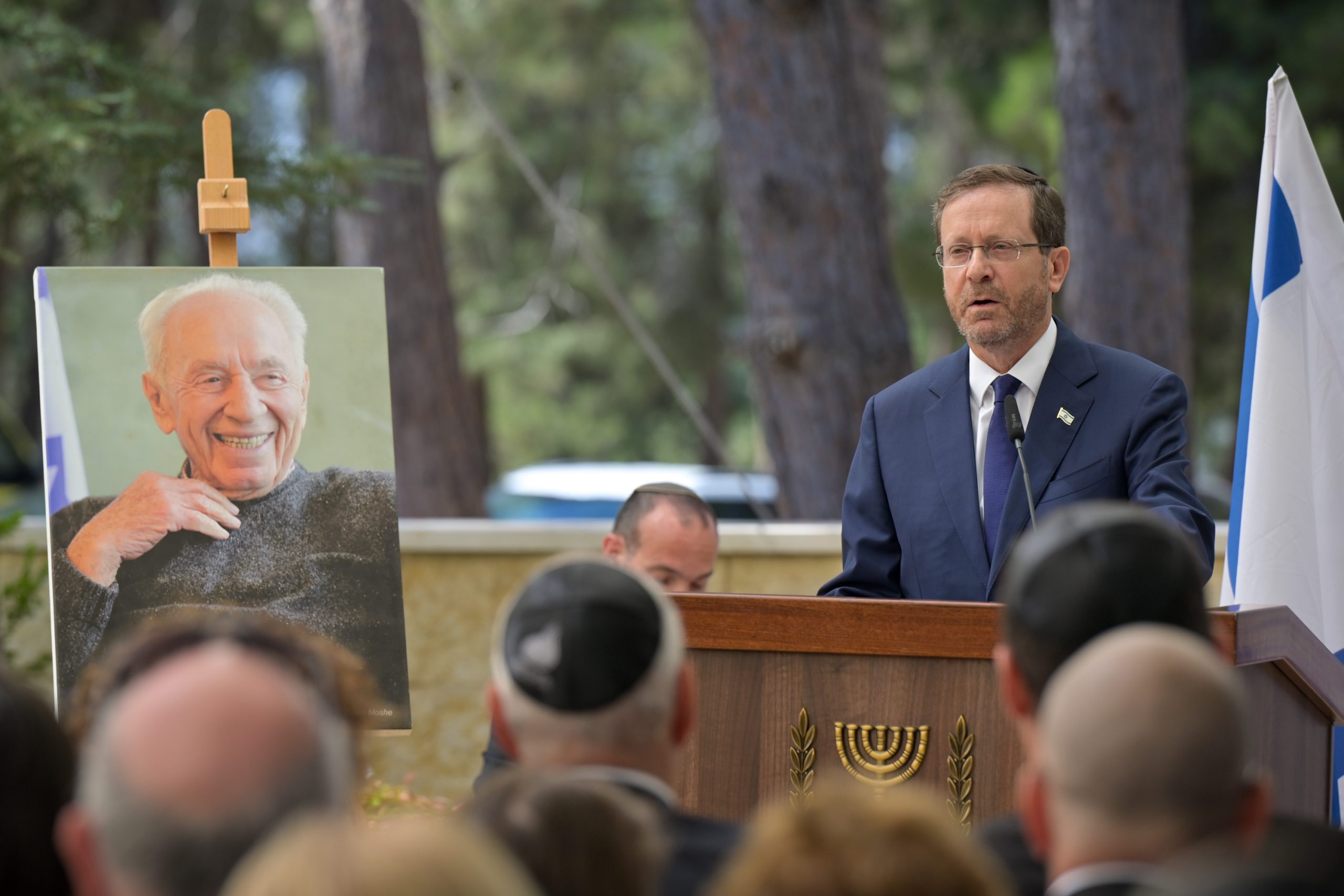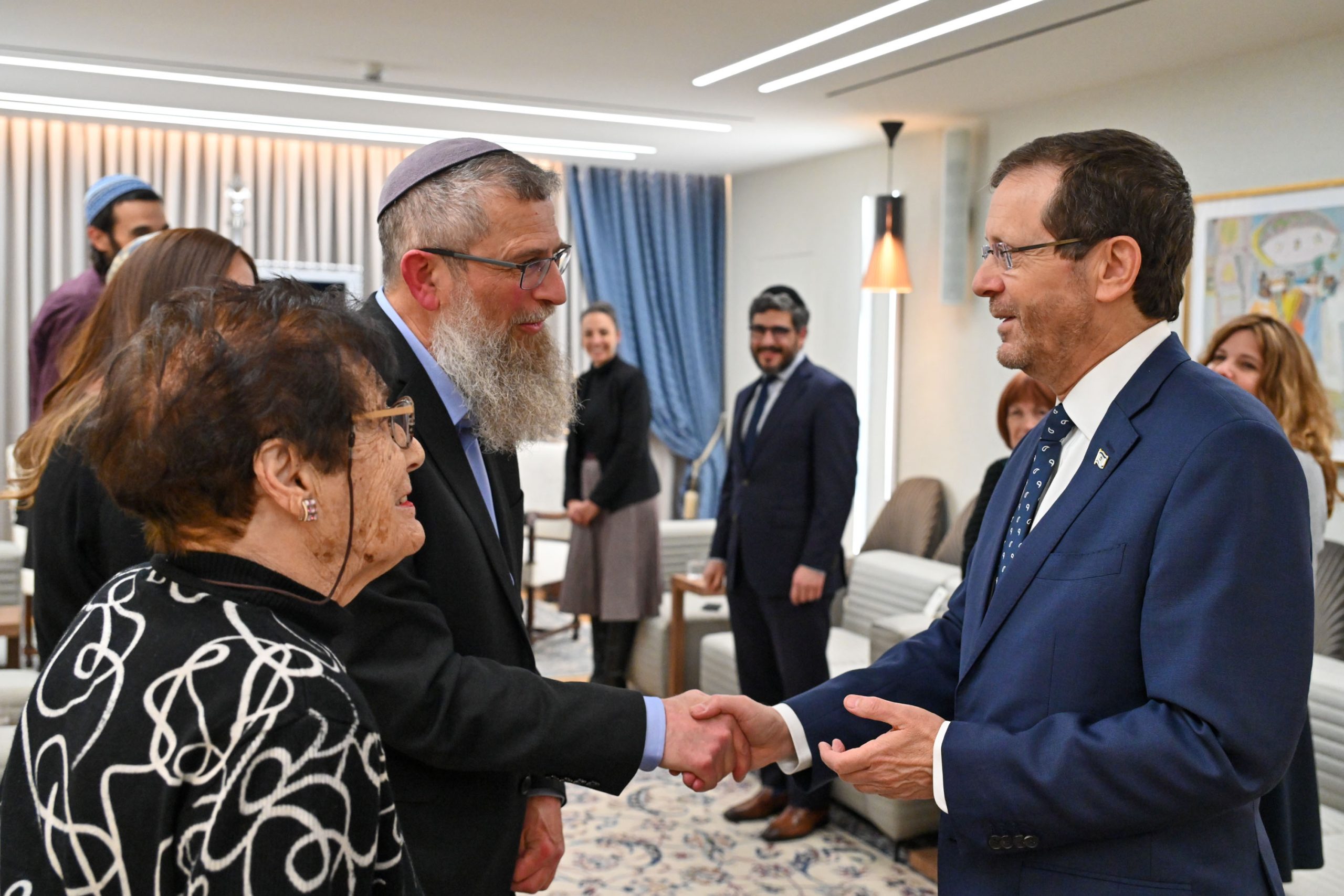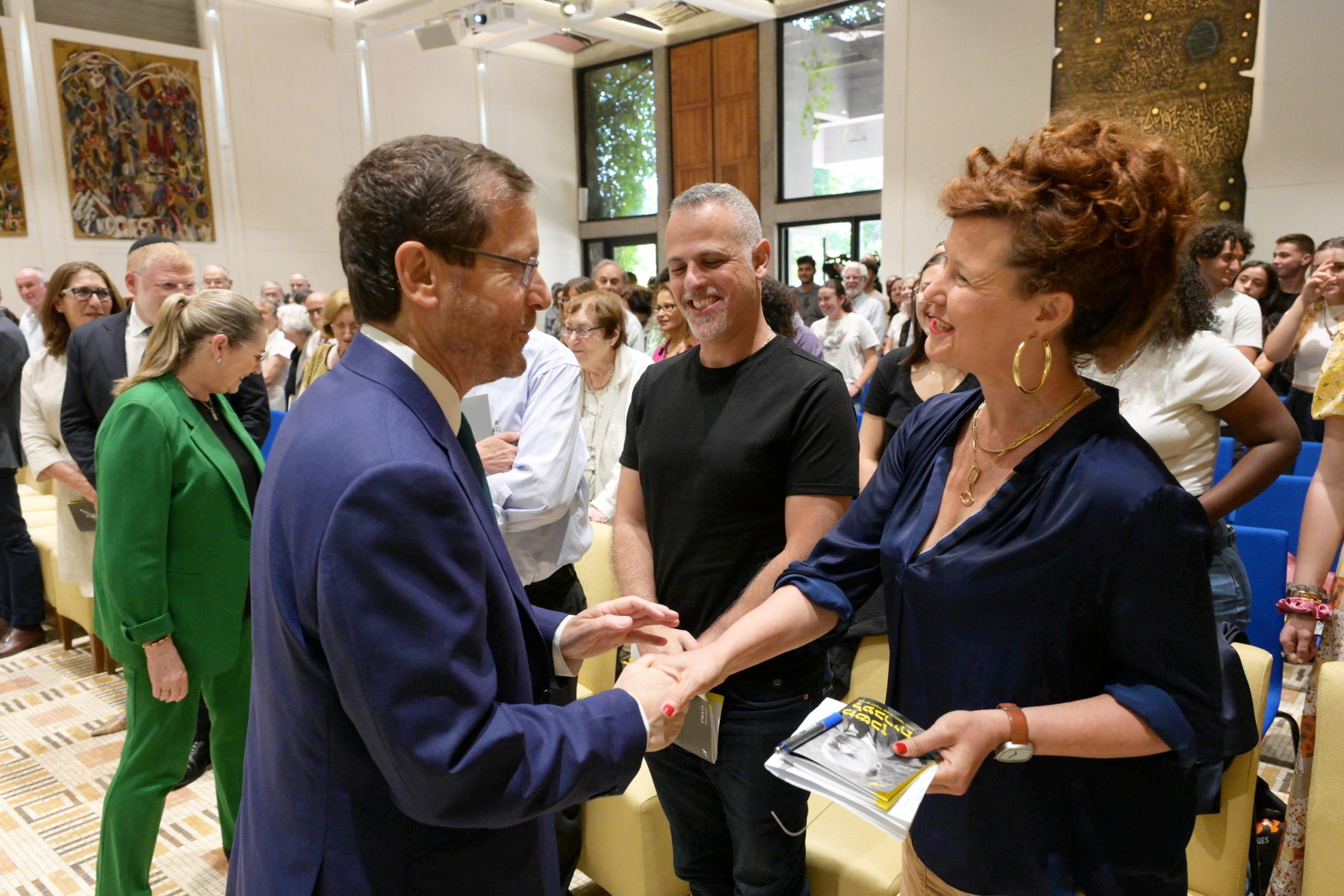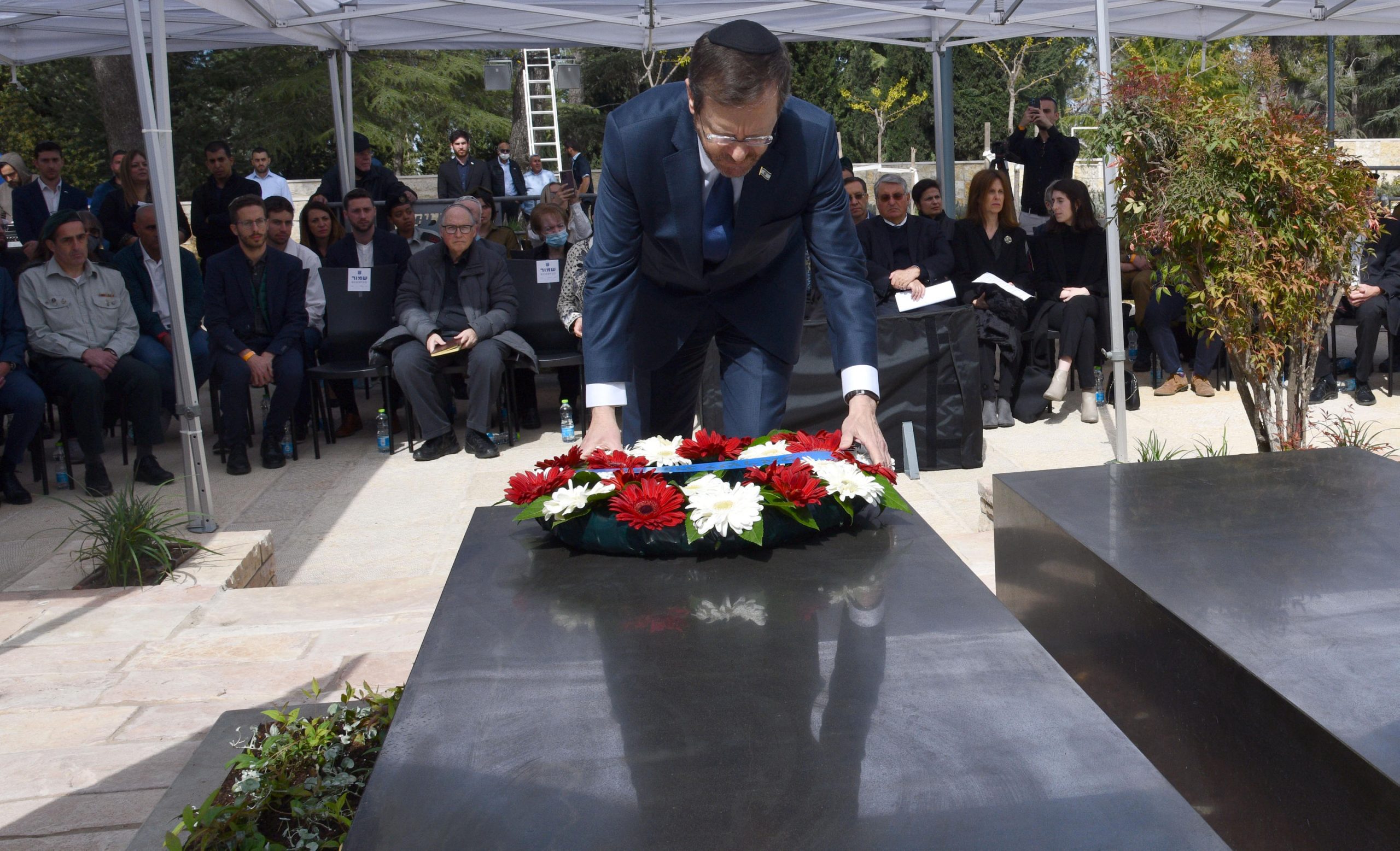President Isaac Herzog’s speech at the memorial ceremony for the Ninth President of the State of Israel, the late Shimon Peres, 4 October 2021
keywords: אזכרה, טקס ממלכתי, שמעון פרס

Credit: קובי גדעון, לע"מ
Many of you sitting here today have many memories of the late Shimon Peres, but I think that I am one of the only ones, besides the family of course, who can say that they knew Shimon Peres almost from the moment they were born. I still remember from my childhood how my mother, may she have a long life, described with affection and humor how in the 1950s she read in Shimon’s palm—we all called him Shimon at home—that he would be prime minister.
I mention this story not just as an amusing anecdote, but because for me Shimon was a tremendous guide, for the whole of my adult life. I spent thousands of hours with Shimon throughout my life. Time that I shall never forget. Moments of joy and excitement, and moments of crisis and sorrow. Among these anguished moments, which I shall never forget, were my visits to Sheba Hospital, joining the prayers and hopes of the whole People of Israel for Shimon to get out of his hospital bed and go back to sharing his wisdom, his guidance, his counsel, to be there for all of us. Hopes that evaporated when we heard, heartbroken, about his passing exactly five years ago.
As you know, two months ago I stepped into the shoes that were once filled by the ninth president, Shimon Peres. Indeed, there is hardly a pair of shoes that he did not fill in our country’s history, and there is almost no public office that he did not hold. Nevertheless, every time I have entered a role, even roles in which President Peres had not previously served, I thought, consciously or unconsciously, about the lessons that I had learned from Shimon.
With your permission, I wish to share three of these lessons.
The first lesson is the diversity of his life and personality, what I shall call here—versatility. The ability to be two things at once, not to get locked into a narrow space, in terms of abilities, knowledge, and practical action. Because having narrow horizons—intellectually and practically—does not allow room to navigate and have influence over the long-term. By versatility, I refer not only to the ability to understand, but also the knowledge of how to lead change in economy, science, and technology, in culture and in sport. By versatility, I refer to infinite knowledge and more importantly, curiosity—an insatiable thirst for knowledge. By versatility I refer to a person’s ability to be Mr. Security, or as my father Chaim Herzog, the Sixth President, described Shimon: “Second only to Ben-Gurion in his contribution to the security of the State of Israel.” To lay the foundations of our security establishment, including some that yielded immense value—to our security and economy—only decades after he built them; to formulate security doctrines with an eye to the very long term. And alongside that, to be a leader identified with the uncompromising pursuit of peace. To be the person who, with his own bare hands, blazed new paths that had until then seemed totally fantastical, important alliances and arrangements that nowadays seem to us quite natural.
The second lesson was persistence and the ability not to give up. I remember one moment that symbolized this “Peresian” quality perhaps more than any other. I often felt that Shimon was afflicted with “Mount Nebo sorrow,” to use the expression coined by the poetess Rachel Bluwstein, an expression that echoes the tragedy of Moses, who did not live to enter the Promised Land. In 1996, I was a special advisor of his. I was with him during the handover of power after his defeat. The morning of the handover, Shimon sat in the Prime Minister’s chair, the bookshelf behind him empty. He got up to welcome the Prime Minister-Elect, Benjamin Netanyahu. His expression was dark, but he also looked like a teacher handing over the baton to his student. His bureau staff were teary-eyed. After some time together, Shimon Peres left the room in silence. And the very next day, while we were still in shock, he invited us all to his temporary office in Tel Aviv, already looking to the future, toward new tasks and inspirational targets. This persistence, this determination, this ability to get up every time he fell and give his all to transforming reality, for the benefit of the people and the state—that is the second lesson that we learned from Shimon Peres.
The third lesson encapsulates, in my eyes, the character of the ninth president—President Peres—more than any other: vision. So many people only look at the present, certainly in the political arena. The here and now sucks us in, along with all our resources. As the ninth president of the State of Israel, Shimon Peres knew to look ahead to the future, to see into the distance, to take flight. There was always a feeling that he was a kind of chess player, and his chessboard was the history of the Jewish People and the State of Israel. Always three, five, ten steps ahead. He looked at challenges, and moreover—and more importantly—identified opportunities. Human, economic, scientific, technological capital. The evolution of humanity and its direction.
Shimon Peres brought these three qualities—versatility, persistence, and vision—to the office of the presidency, and he led this important institution to new heights. He successfully bridged his deep roots, intellectual greatness, and phenomenal historical and cultural knowledge, with progress and technology, and with actively connecting the future generation to its country. He led the State of Israel to its impressive position within the family of nations, with wisdom, remarkable statesmanship, and uncompromising determination. In this sense, there is no doubt that his unforgettable funeral, which attracted the most prominent leaders from all around the globe, was a fine reflection of his international image and stature. His feet were rooted in the soil, but his eyes looked beyond the horizon. He, who achieved so much, always taught us to dream. Out of infinite optimism, out of faith in man. Out of the understanding that, as he used to say: “Optimists and pessimists die the same way. They just live differently.” On behalf of myself and my wife Michal, I want to embrace you—dear Peres family, Chemi, Tziki, and Yoni, grandchildren, the whole family, and all friends and others who cherish his memory, and first and foremost of course the dear team of the Peres Center for Peace and Innovation. May the memory of President and Prime Minister Shimon Peres be a blessing, and may he remain forever in our hearts.





